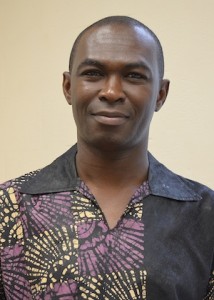Africana Studies Chair to Research Sustainability With Carnegie Foundation Funding

Sustainability is an international concern, and for one UNC Charlotte professor the challenge is to bring new understanding to how Nigerians can view sacred groves as secular green spaces, through in-depth research with global implications.
“Sacred groves are spiritual centers, but they have historical and secular value, too,” said Akin Ogundiran, professor and chair of the Africana Studies Department in the College of Liberal Arts & Sciences. Recently, he received a fellowship from the Carnegie Foundation to fund an international collaboration with Benjamin Ogunfolakan, director of the Natural History Museum, Obafemi Awolowo University, Nigeria.
“In many Nigerian cities, it is difficult to locate green spaces. In the name of modernization, urban centers have eliminated such areas,” Ogundiran said. “In the West, we talk about sustainability in secular language; we talk about the social value of green spaces. In Nigeria, the sacred groves have been preserved for their religious significance.”
In Nigeria, sacred groves are large tracts of natural areas with trees and other vegetation; often, they contain religious shrines. Western cities incorporate parks and other green spaces into neighborhood planning, which is not part o f the cultural history of Nigeria.
f the cultural history of Nigeria.
Ogundiran and Ogunfolakan plan to develop an educational exhibit and new college courses designed to bring awareness of how sacred groves can become viable green spaces for urban centers in Nigeria.
During summer 2015, the Africana Studies chair will travel to Nigeria to collaborate on the development of the public exhibit “Sacred Groves and Green Sustainability in Nigerian Cities” and to plan three collegiate courses focused on the theme of sacred groves, resource management and sustainable environment. A virtual version of the exhibition also is part of the project.
“Historically in Nigeria, trees and bushes are seen as rural, while concrete and asphalt define a city,” Ogundiran explained. “The result is increased pollution, soil erosion and a higher carbon footprint. Policymakers and students are shifting attention to how better to manage sacred groves and resist the pressure to destroy remaining green spaces.”
 In comparison, Charlotte has set aside some space within its urban core for green spaces. “Charlotte is an example of a modern, thriving city; however, it has a history of building green spaces as part of its urban core,” said Ogundiran. “For sacred groves to maintain their religious integrity, while serving multiple roles as a park or secular space in Nigeria, this is a different challenge from Charlotte’s Independence or (Romare) Bearden parks.”
In comparison, Charlotte has set aside some space within its urban core for green spaces. “Charlotte is an example of a modern, thriving city; however, it has a history of building green spaces as part of its urban core,” said Ogundiran. “For sacred groves to maintain their religious integrity, while serving multiple roles as a park or secular space in Nigeria, this is a different challenge from Charlotte’s Independence or (Romare) Bearden parks.”
The courses developed by Ogundiran and Ogunfolakan will be available to students at UNC Charlotte and Obafemi Awolowo University through distance learning technology. The goal is to promote better understanding between the two countries on how to approach common problems.
“UNC Charlotte is preparing its students to live in a global community, and providing opportunities through international collaboration is important to fostering that understanding,” Ogundiran. “My collaborator Benjamin Ogunfolakan will be visiting UNC Charlotte this spring with the idea that he will gain a greater understanding of how the United States approaches sustainability.”
Ogundiran’s interdisciplinary research interests focus broadly on the archaeology and cultural history of Atlantic Africa and the African Diaspora. He has received support for his research from Dumbarton Oaks, Social Science Research Council, Wenner-Gren Foundation for Anthropological Research, National Endowment for the Humanities, Boston Humanities Foundation, and the National Science Foundation-supported programs, among others.
Words: Phillip Brown, UNC Charlote Internal Communication Manager
Image of Nigerian grove: Courtesy of Akin Ogundiran
Images of Bearden Park and of Akin Ogundiran: Lynn Roberson, UNC Charlotte CLAS Communications Director